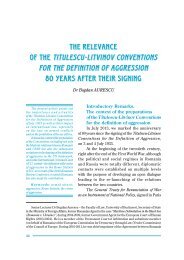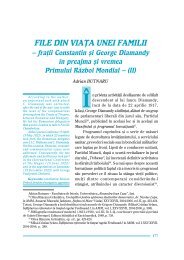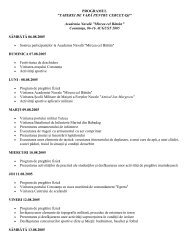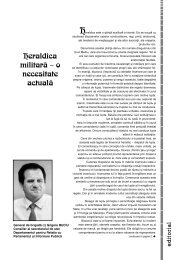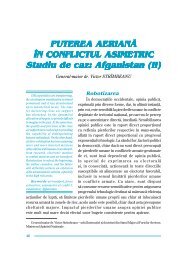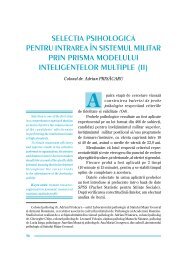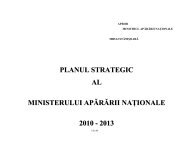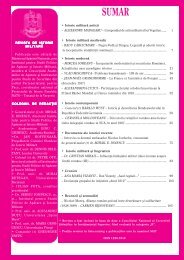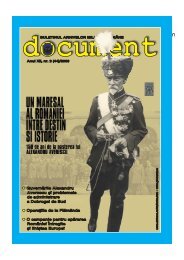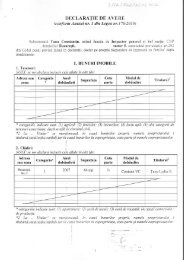Create successful ePaper yourself
Turn your PDF publications into a flip-book with our unique Google optimized e-Paper software.
attitude was founded on his fear that Serbia and<br />
Romania would sign a separate peace. To avoid<br />
isolation and to gain Romanian support, Greece<br />
must accept an armistice, a policy which Constantine<br />
rejected out of hand. He agreed to the Porto<br />
Lagos line only if negotiations in Bucharest reached<br />
a deadlock.<br />
Finally, on 12 July, when Maiorescu expressed<br />
the wish that he might attend the conference,<br />
Venizelos decided to head the peace delegation,<br />
which included N. Politis, A. Pallis and D. Panas,<br />
who was to join them at Belgrade. Venizelos left<br />
for Bucharest on 13 July, dissatisfied with his<br />
arrangement with Constantine on the question of<br />
the armistice. He intended to communicate the<br />
Greek peace terms to the Bulgarian delegation upon<br />
his arrival. If the Bulgarian reply left room for<br />
hope, he would instruct Alexandropoulos and<br />
Rangabe, who had remained at Nish, to sign the<br />
armistice.<br />
After having refused for eighteen days to accept<br />
an armistice, on 15 July, King Constantine instructed<br />
Venizelos to sign it. As soon as Venizelos<br />
arrived in Bucharest on the 16 July, he communicated<br />
to the Bulgarians his intention. He had also<br />
informed the Commander in Chief that Maiorescu<br />
had agreed to propose in the first session, which<br />
was to take place that day, the signing of a five-day<br />
suspension of hostilities, which would take effect<br />
the following day. On 17 July, the first plenary<br />
session of the conference accepted Venizelos’<br />
proposal of a five-day suspension of hostilities.<br />
On the next day, the peace delegations in<br />
Bucharest agreed to have separate private meetings<br />
with the Bulgarians, so that only irreconcilable<br />
differences would be brought to the conference.<br />
The Bulgarians and Romanians had no great<br />
difficulty in reaching an agreement. By 18 July,<br />
most of the points of their agreement had been<br />
settled and Bulgaria was hoping for a separate<br />
Bulgaro-Romanian peace treaty. Maiorescu,<br />
however, declared to the conference that the<br />
agreement between the Romanian and Bulgarian<br />
delegations was not a separate treaty, but only the<br />
first step towards a general settlement.<br />
The major obstacle of the conference was the<br />
question of Kavala and owning to its importance as<br />
the center of tobacco commerce, this question<br />
aroused international interest. On his arrival at<br />
Bucharest, Venizelos discovered that none of the<br />
Great Powers would support him actively on the<br />
question of Kavala. In order to gain use of Kaiser<br />
Wilhelm’s influence on King Carol, Queen Sophia<br />
of Greece, telegraphed Constantine’s request for<br />
‘ein gutes Wort’ about Kavala to her brother Kaiser<br />
Wilhelm and he, in turn, communicated it to King<br />
Carol. The Romanian King offered to mediate for<br />
a frontier beginning between Kavala and Porto<br />
Lagos, which was acceptable to Venizelos.<br />
The conference meeting of 22 July coincided<br />
with the end of the five-day cease-fire. King<br />
Constantine, although dreading the possibility of a<br />
renewal of hostilities without Serbian and Romanian<br />
support, was not prepared to grant Bulgarian<br />
demands or to ask for an extension of the ceasefire.<br />
To do this, he believed, would expose the<br />
weakness of his position. He hoped that the other<br />
belligerents would have failed to reach an<br />
agreement with the Bulgarians and that one of<br />
them would propose the extension of the ceasefire.<br />
At the meeting, however, Maiorescu announced<br />
that Bulgaria and Romania had reached<br />
an agreement and that at the expiry of cease-fire<br />
the Bulgarians hoped to continue the war against<br />
Serbia and Greece. He hastened to explain that<br />
Romania would not sign a separate treaty, but would<br />
support her cobelligerents. He then communicated<br />
the Austria-Hungarian and British communications<br />
concerning Kavala and proposed the<br />
extension of the cease-fire for three more days.<br />
Maiorescu’s declaration concerning the conditional<br />
character of the Romano-Bulgarian agreement<br />
shattered Bulgarian hopes of isolating<br />
Greece and Serbia. The Bulgarian delegation<br />
accepted the renewal of the cease-fire. 11<br />
The Greek delegation to Bucharest encountered<br />
fierce resistance to its territorial demands,<br />
48 ����� Review of Military History �����



